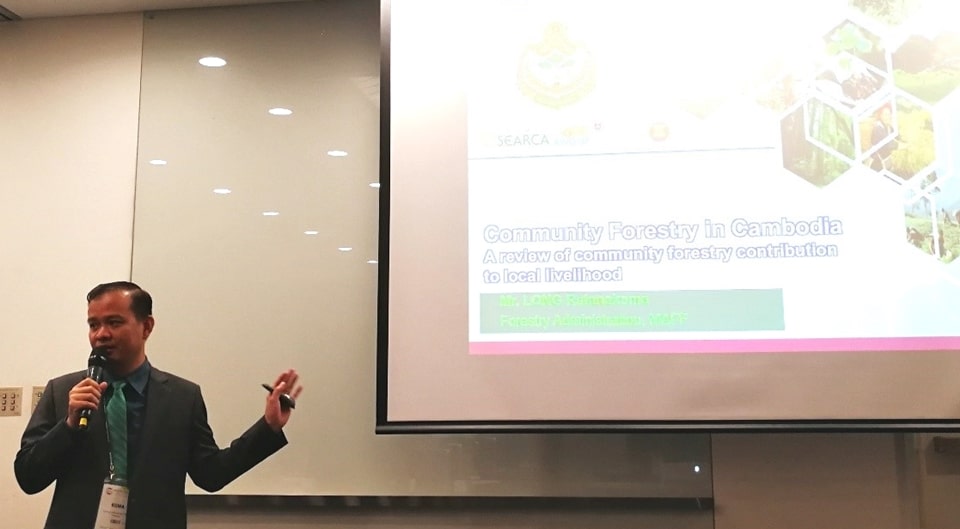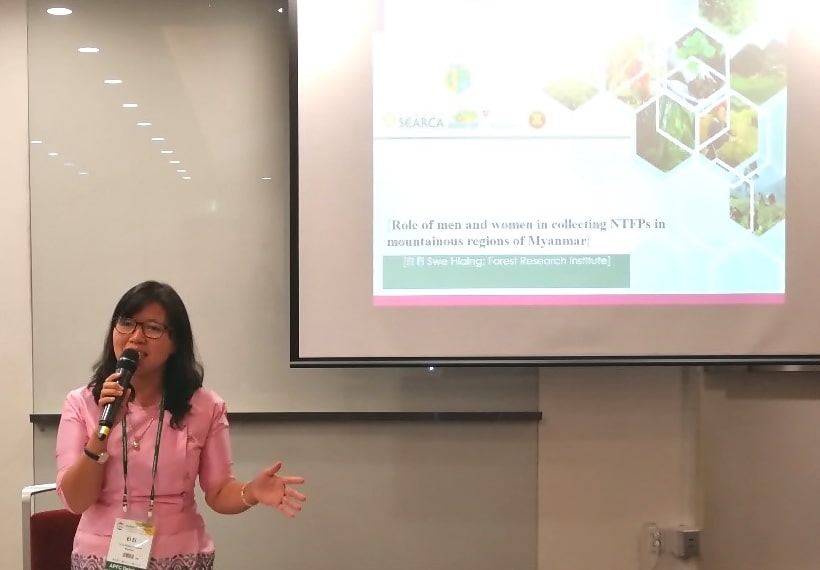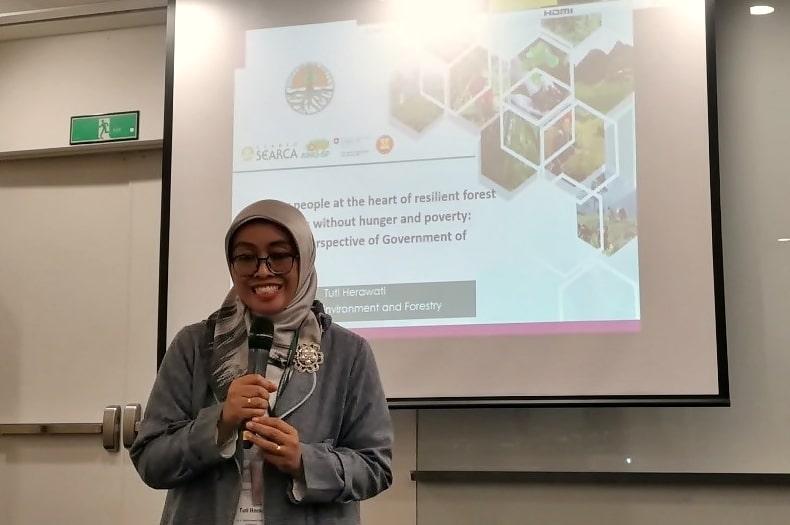INCHEON, South Korea – The Southeast Asian Regional Center for Graduate Study and Research in Agriculture (SEARCA), through its administration of the ASEAN Working Group on Social Forestry (AWG-SF) Strategic Response Fund (ASRF), has awarded travel grants to Mr. Long Ratanakoma of Cambodia, Dr. Tuti Herawati of Indonesia, and Dr. Ei Ei Swe Hlaing of Myanmar. The ASRF travel grantees participated in the Asia Pacific Forestry Week (APFW) 2019 in Songdo ConvensiA, Incheon, Korea on 17-21 June 2019. The grants are awarded as part of the initiative to disseminate scientific knowledge vital to social forestry and the interrelated issues of climate change and food security.
 Mr. Long Ratanakoma presenting in Session 4: Thriving forest-based livelihoods through partnershipsMr. Long Ratanakoma, Deputy Director, Department of Forest and Community Forestry – Forestry Administration, served as resource person in Session 4: Thriving forest-based livelihoods through partnerships. Mr. Ratanakoma presented the result of their ASRF project titled Community Forestry in Cambodia – A Review of community forestry contributions to livelihoods after 25 years of development. He shared that the project team was able to develop, publish and disseminate eight case studies on community forestry (CF) experience in Cambodia. It was found that almost all of CF members benefit from the forest for their household consumption of income generation through the collection of various non-timber forest products (NTFP). In addition, NTFPs from CF provide significant income for members. In each study site, there is one major product that members collect from CF and sell.
Mr. Long Ratanakoma presenting in Session 4: Thriving forest-based livelihoods through partnershipsMr. Long Ratanakoma, Deputy Director, Department of Forest and Community Forestry – Forestry Administration, served as resource person in Session 4: Thriving forest-based livelihoods through partnerships. Mr. Ratanakoma presented the result of their ASRF project titled Community Forestry in Cambodia – A Review of community forestry contributions to livelihoods after 25 years of development. He shared that the project team was able to develop, publish and disseminate eight case studies on community forestry (CF) experience in Cambodia. It was found that almost all of CF members benefit from the forest for their household consumption of income generation through the collection of various non-timber forest products (NTFP). In addition, NTFPs from CF provide significant income for members. In each study site, there is one major product that members collect from CF and sell.
 Dr. Ei Ei Swe Hlaing presenting in Session 5: Youth and gender inclusion in forestryDr. Ei Ei Swe Hlaing, Assistant Director, Forest Research Institute of Myanmar, served as resource person in Session 5: Youth and gender inclusion in forestry. Dr. Ei Ei presented the Role of Men and Women in Collecting NTFPs in Mountainous Regions of Myanmar, which is part of their ASRF project titled Assessment of NTFPs in Mountainous Regions of Myanmar towards Community Forestry Development. She highlighted that women, both young and old, are empowered through the income that they get from NTFPs, minimal as it is, and are able to contribute to household expenses. She concluded that enabling policies and practices that empower women in the forestry sector should be put in place. This will yield significant benefits to food and nutrition security and sustainable management of the forest.
Dr. Ei Ei Swe Hlaing presenting in Session 5: Youth and gender inclusion in forestryDr. Ei Ei Swe Hlaing, Assistant Director, Forest Research Institute of Myanmar, served as resource person in Session 5: Youth and gender inclusion in forestry. Dr. Ei Ei presented the Role of Men and Women in Collecting NTFPs in Mountainous Regions of Myanmar, which is part of their ASRF project titled Assessment of NTFPs in Mountainous Regions of Myanmar towards Community Forestry Development. She highlighted that women, both young and old, are empowered through the income that they get from NTFPs, minimal as it is, and are able to contribute to household expenses. She concluded that enabling policies and practices that empower women in the forestry sector should be put in place. This will yield significant benefits to food and nutrition security and sustainable management of the forest.
 Dr. Tuti Herawati presenting in Session 6: Putting people at the heart of resilient forest landscapes without hunger and povertyDr. Tuti Herawati, Deputy Director of Community Forestry, Directorate General of Social Forestry and Environment Partnership, served as resource person in Session 6: Putting people at the heart of resilient forest landscapes without hunger and poverty. Dr. Tuti shared the experience of Indonesia from the perspective of the Ministry of Environment and Forestry. She shared how social forestry benefits the community through economic, social and environmental benefits. Furthermore, she underscored the four key factors for successful social forestry-based business development, namely, legal access, agroforestry practice and tourism, market access, and facilitation for capacity building and financial support.
Dr. Tuti Herawati presenting in Session 6: Putting people at the heart of resilient forest landscapes without hunger and povertyDr. Tuti Herawati, Deputy Director of Community Forestry, Directorate General of Social Forestry and Environment Partnership, served as resource person in Session 6: Putting people at the heart of resilient forest landscapes without hunger and poverty. Dr. Tuti shared the experience of Indonesia from the perspective of the Ministry of Environment and Forestry. She shared how social forestry benefits the community through economic, social and environmental benefits. Furthermore, she underscored the four key factors for successful social forestry-based business development, namely, legal access, agroforestry practice and tourism, market access, and facilitation for capacity building and financial support.
SEARCA, a partner in the ASEAN Swiss Partnership on Social Forestry and Climate Change (ASFCC), manages the ASRF, a flexible funding mechanism that aims to enable AWG-SF Leaders and Focal Points to quickly respond to emerging issues and challenges and articulate policy recommendations and directions on social forestry.